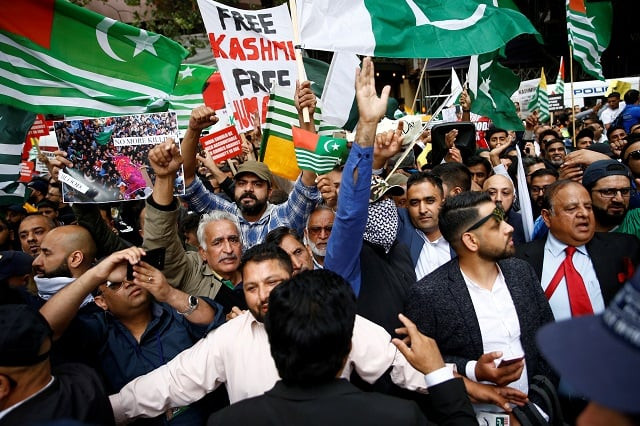The plebiscite puzzle
All these years, Pakistanis and Kashmiris have blamed India for breaching a solemn pledge made to Kashmir

Kashmir protests. PHOTO: AFP
All these years, Pakistanis and Kashmiris have blamed India for breaching a solemn pledge made to the Kashmiris, the world and the UN. Meanwhile, Indians have insisted that Pakistan is at fault for not vacating Azad Kashmir first, as required by the UN resolutions.
However, if Demystifying Kashmir, a well-researched account of the developments leading to the bleeding stalemate between India and Pakistan is to be believed, India went back on its pledge because of the UN’s “blatantly one-sided and partisan approach”.
The author, Navnita Chadha Behera, teaches at Delhi University. While she blames Britain for driving India to retract its plebiscite offer, what actually seems to have happened is: Britain, having had first-hand knowledge of the developments taking place in Kashmir immediately before and after mid-August 1947, had seen through the falsifications that were being resorted to by the Indians at the UN.
“India’s appeal to the UNSC had focused on Pakistan’s aid to the ‘invading tribesmen’, claiming that such assistance constituted an act of aggression against India in view of Kashmir’s accession to India.”
On the other hand, the “British strategy was to get the UNSC to ‘simply ignore India’s complaint of aggression and go straight to the terms of a plebiscite. The British proposals, draft resolutions, and ‘background papers’ for allies such as the US and the president of the UNSC prepared during January and February 1948 took a giant leap and questioned India’s sovereign right over Kashmir. Sought not only removal of the maharaja but also Sheikh Abdullah’s government in Srinagar; suggested a practical ‘takeover’ of Kashmir administration by a UN-appointed Council of Administration; and would allow Pakistan’s regular soldiers to replace Muslim invaders and have them police predominantly Muslim parts of the state (Kashmir Valley), while India would be required to withdraw its troops to predominantly Hindu parts.”
According to Behera’s research, Nehru’s foremost concern “was to have the raiders driven out and nullify their capacity to coerce people, arouse communal passions and weaken the nationalist forces; also to forestall the Pakistan Army’s formal involvement.”
However, “On the day that India approached the UN, the British launched a far-reaching exercise to legitimise the Pakistani version of the dispute, charging that the conflict was not, as India claimed, with tribesmen and others incited and armed by Pakistan but with local insurgents who had rebelled against the maharaja when he acceded to India, whom the Indian Army was attempting to crush.”
Nehru denounced Britain’s “ex parte conclusions” in an angry telegram to PM Clement Attlee, and publicly expressed shock that “power politics and not ethics were ruling the UNO”.
“Subsequent attempts to broker an unconditional ceasefire further incensed Nehru because the order would apply only to India — until then Pakistan had not even admitted having its own army in Kashmir.
“Although a plebiscite in Kashmir remained India’s official policy from 1947-54, by late 1948 Nehru was skeptical of its realisation. The first indication came in July 1948 when Nehru intimated that he would not be opposed to the ‘idea of dividing the country between India and Pakistan’.”
Behera laments that India had never quite succeeded in refuting three misconceptions about the Kashmir conflict that were a direct result of British interventions in the UNSC: “First, it was not a Hindu-Muslim conflict in Kashmir. Second, the trouble in Kashmir did not proceed from accession. In fact, the invasion preceded accession. Third, India’s commitment to hold plebiscite was self-imposed; there was nothing compelling it since the signing of the Instrument of Accession would have achieved its desired goal.”
Published in The Express Tribune, August 17th, 2019.
Like Opinion & Editorial on Facebook, follow @ETOpEd on Twitter to receive all updates on all our daily pieces.













COMMENTS
Comments are moderated and generally will be posted if they are on-topic and not abusive.
For more information, please see our Comments FAQ